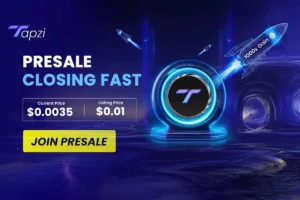Tapzi Leads 2025 with Gasless Blockchain Gaming Innovation

While Web3 gaming promised to evolve the gaming paradigm through platforms that are decentralized, it never revealed the cost that people had to bear. Since Ethereum became the foundation of many blockchain games, little did people know that they would have to pay for every little action, even progressing from one level to another.
In a more ridiculous turn of events, even making a move, a special attack for instance, was made so complicated that it needed a gas fee to complete. As a result, gameplay pace within the blockchain ecosystem has become more of a slog.
Things have started to change, however, thanks to the arrival of Tapzi. A cryptocurrency project currently on presale, it has introduced the unique concept of gasless gaming, where the perks are plenty, the games are more streamlined, and fun remains at the center of the ecosystem. In what ways it improves the gaming experience, however, is the question this article answers.
Shortcomings of Gas-Fee Gaming
Gas-fee gaming has become so prominent that many have grown complacent about it. They don’t expect games to be more than they are, which has led to them stepping back and not thinking about the shortfalls. That’s why, before diving into the positives that gasless gaming brings to the table, it is important to know the negative costs associated with sticking to the status quo.
High Entry Barriers
Games should be welcoming to all, which is not the case when gas-based crypto gaming is considered. Even stepping foot inside such an ecosystem requires users to hold native tokens already, which means just booting up the game can be expensive. This leads to confusion among newcomers, who rightly find the prospect of “paying money just to start the system” very alien.
Interrupted Gameplay
What fun is there to be had in a game where every step requires a fee? Take a turn-based game, for instance, and imagine having to pay to take every single turn. It is not gameplay, it is an exercise in investment with no rhythm to the game or sense of fun—just an act of chasing losses.
Unpredictable Costs
Gas-based games not only have costs when turns are taken, but they also have costs that users don’t fully understand. Gas prices fluctuate based on network conditions, leaving blockchain games at the mercy of the market. Players never know what the true cost of the game is.
Not Meant for Casual Players
Gas fees make every move taxing, not just on the mood but also on the wallet. If every move requires payment, no move is fun. Casual players, therefore, stay away. This has already created a dissonance between casual and Web3 players. Web3 players consider casual players “brokies” for not engaging with blockchain play, while casual players call Web3 players delusional for labeling a glorified earning mechanic as a game.
Gasless Gaming Ecosystem: Focusing on Latent-Free Fun
On the other end of the spectrum is gasless gaming, which addresses each of the shortcomings to make Web3 gaming better. Here is how it improves the experience.
Seamless Gaming Experience
Since there is no need to stop after every move to pay gas fees, games no longer have to interrupt the flow. This makes the experience seamless and closer to the Web2 gaming approach, which is more natural and enjoyable.
Lowering Entry Barriers
Gasless gaming ecosystems use an off-chain, free approach to gaming. This means that new users can enjoy a single-player game without paying anything in gas fees. As the entry barrier is removed, casual players will find it easier to interact with the games.
Improved Accessibility
With barriers removed and gameplay becoming more seamless, global participation is encouraged. In regions where the fee is high, the cost disadvantages are eliminated, ensuring that the adage “culture should not only be accessible to those who can afford it” remains true. This simple belief could improve the image of blockchain gaming for everyone.
Developer-Friendly Models Emerging
With gas fees removed, barriers that once restricted creative monetization dissolve. Beyond DeFi, this opens doors for actual competitions, sponsorships, and proper in-game reward systems that rely not on luck or waiting but on gameplay elements.
Conclusion
The true essence of gaming, fun, can only penetrate the blockchain ecosystem when the old guard of gas fees is removed. That is the only way games can be streamlined to become better. And that is what Tapzi is trying to do. Its gameplay approach is simple, and by removing gas fees, it allows a competitive touch to be integrated into every game it designs.
Recent Posts
Can Presale Tokens Go Back to Zero?
Investing in a presale is taking a bet on a project in its earliest stage.…
- Blog
How Perpetual Swaps Work on Decentralized Exchanges – A Technical Breakdown
Decentralized perpetual trading platforms control over 8% of the total crypto Perps trading activity, challenging…
- Blog
Low-Fee vs. High-Leverage – How to Choose the Optimal Exchange for Your Trading Strategy?
Leverage traders are often enticed by high leverage because it enables them to boost their…
- Blog
6 Proven Crypto Perpetual Futures Trading Strategies – Complete Guide
Highlights Perpetual Futures trading strategies are tactics used by perpetual traders to generate profit from…
- Blog
Is Borrowing Against Bitcoin Worth It? A Data-Driven Analysis
“Don’t sell your Bitcoin. Borrow against it.” This is a popular Subreddit that, although only…
- Blog
Why Meme Culture Is Evolving and Shifting Toward Purpose, Consciousness, and Culture
Memes have shaped the internet’s personality over the past decade, flooding its systems with inside…